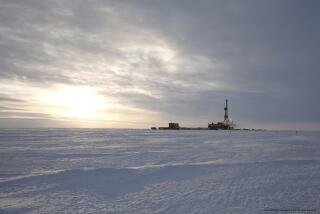Norton Admits ‘Mistake’
- Share via
PORTLAND, Ore. — Interior Secretary Gale A. Norton on Friday said “we did make a mistake” in mischaracterizing patterns of caribou calving in reviewing how oil drilling could affect Alaska’s Arctic National Wildlife Refuge.
The fate of the refuge has become one of the most contentious environmental issues facing Congress and the Bush administration, which strongly favors drilling there and argues that it will reduce America’s dependence on foreign oil supplies.
Norton’s misstatement about the caribou occurred in a July letter to a Senate committee in which she downplayed the environmental impact of drilling.
“We will take steps to clarify and correct that,” Norton said of her error. However, she addressed only one of a series of discrepancies between data provided to her by the U.S. Fish and Wildlife Service and the information she gave Congress.
Norton acknowledged the error in a speech at the annual meeting of the Society of Environmental Journalists here.
In her July 11 letter to the Committee on Energy and Natural Resources, she was responding to its questions about how oil drilling could affect the Porcupine caribou herd, which migrates annually to the refuge and its environs.
Documents released by an environmental advocacy group that represents government employees show that a review of caribou impacts by the Fish and Wildlife Service--an agency Norton oversees--was substantially changed in Norton’s letter to Committee Chairman Sen. Frank H. Murkowski (R-Alaska). The Washington Post reported some of those changes in a Friday story.
In her remarks here, Norton explained why she erroneously wrote Murkowski that in regard to the Porcupine caribou, “Concentrated calving occurred primarily outside the 1002 Area in 11 of the past 18 years.”
In fact, she said, the Fish and Wildlife Service had reported that concentrated caribou calving did occur in the 1002 Area, the area designated for drilling, in 11 of the last 18 years.
“That was correct. It was correct on the maps. In sending that letter, we transposed it, saying that in 11 of the 18 years, that the calving appeared outside of the [proposed oil exploration] area.”
Norton did not address other criticisms of her letter that mixed and matched different sources of information, except to say, “We also had information that came from other bureaus and we incorporated that in the letter.”
Leaders of Public Employees for Environmental Responsibility, which released draft documents from the Fish and Wildlife Service and the final letter, said Norton substantially altered the agency’s biological findings.
Documents show that the Fish and Wildlife Service reported that reproduction of the Central Arctic caribou herd appears to have been affected by oil development in Prudoe Bay. For instance, the birthrate for an undisturbed area was 83% from 1988 to 1994, while the rate was 64% in a developed area in the same period, the service wrote.
Norton’s letter states that “Parturition and recruitment data do not support the hypothesis that oil fields adversely affect caribou productivity.”
Mark Pfeifle, press secretary for Norton, said Friday that Norton believes in collecting information from many sources, and data was sought from the Fish and Wildlife Service, the U.S. Geological Survey and the Bureau of Land Management, all Interior agencies, he said.
Information also was included from an article that appeared in the Wildlife Society Bulletin, a scientific journal. The article acknowledges receiving “encouragement, funding and useful comments” from employees of oil field operator BP Exploration.
In her remarks Friday, Norton said the Sept. 11 terrorist attacks have strengthened the resolve of the administration to reduce America’s reliance on foreign oil.
She complained that the U.S. even imports oil from Iraq, funneling $4 billion a year into the economy of Saddam Hussein, who is suspected of sponsoring terrorism.
More to Read
Sign up for Essential California
The most important California stories and recommendations in your inbox every morning.
You may occasionally receive promotional content from the Los Angeles Times.













